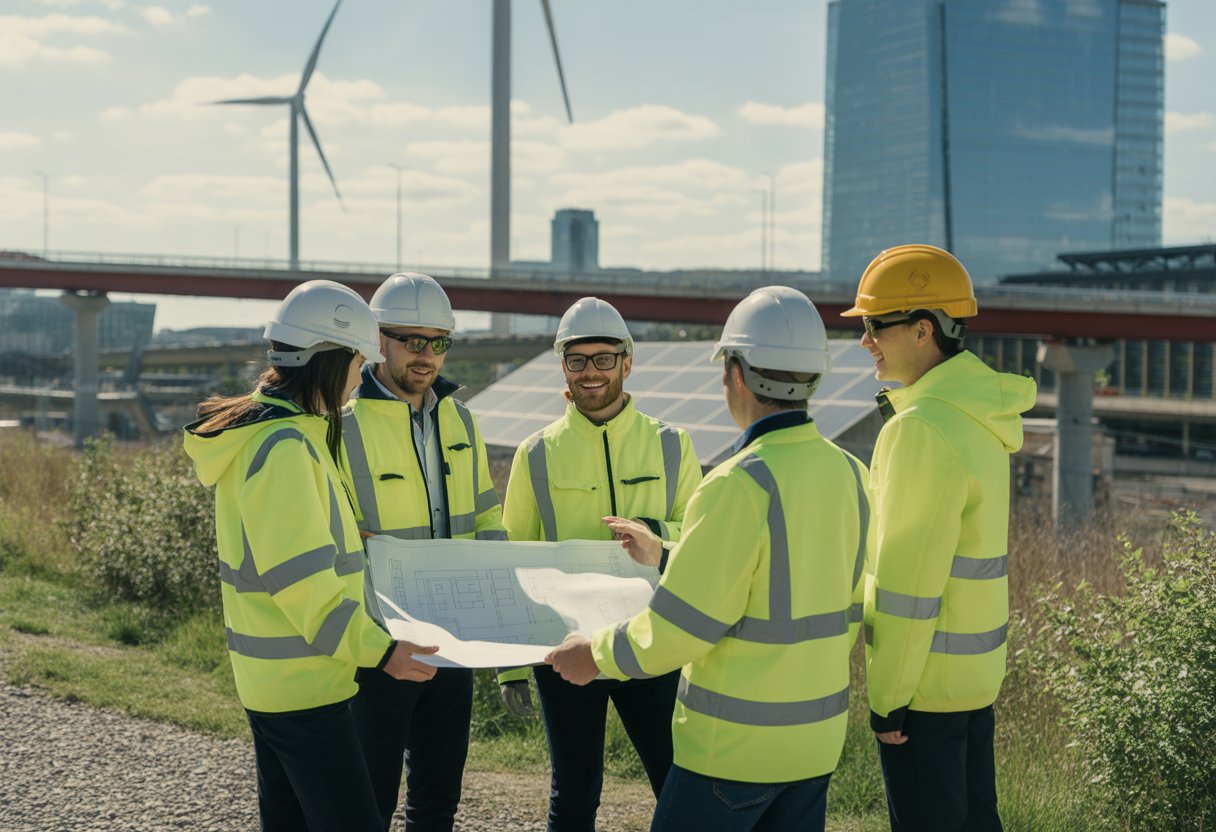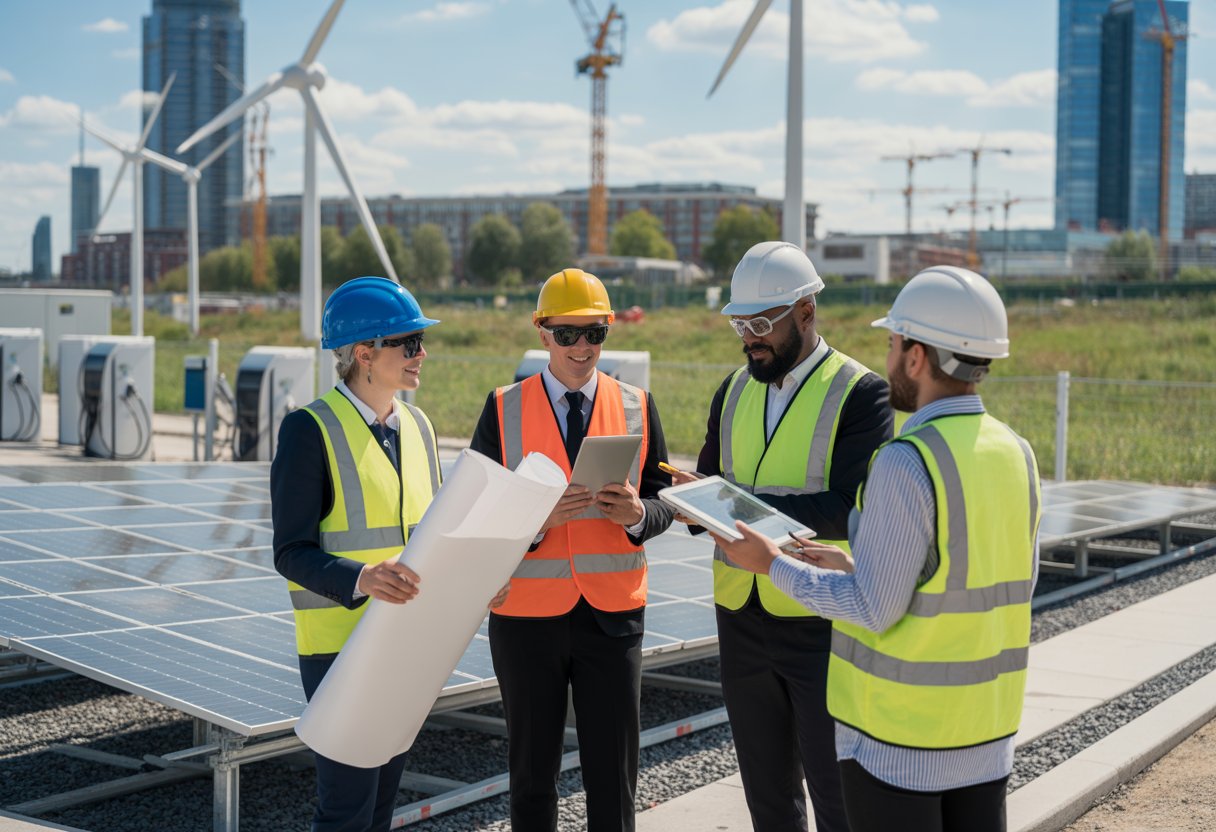The Future of UK Infrastructure: Skilled Project Managers Driving Progress Towards Net Zero
Achieving net zero by 2050 is a major challenge for the UK, but recent surveys show that project managers are confident in reaching this goal. Skilled project managers are playing a crucial role in transforming the country’s infrastructure, driving forward projects that reduce carbon emissions and support sustainable growth. Their leadership is essential for planning, coordinating, and delivering complex projects that align with national climate targets.

Interest in the project profession is rising as more organisations recognise the value of expertise in delivering green and sustainable infrastructure. With a focus on new skills and innovative thinking, project managers are helping the UK secure a cleaner, more resilient future. This article explores how their work is powering progress towards a net zero economy.
The Importance of Net Zero for UK Infrastructure

Achieving net zero by 2050 is shaping how the UK plans, builds, and manages its infrastructure. Meeting climate targets will require careful investment, skilled leadership, and a shift towards new energy technologies.
Driving Forces Behind Net Zero Commitments
Several factors are pushing the UK towards net zero. Climate change presents clear environmental, social, and economic risks that must be managed. The Climate Change Committee and the Intergovernmental Panel on Climate Change have highlighted the urgent need to lower greenhouse gas emissions.
Transitioning to a net zero economy promises benefits such as cheaper energy, improved air quality, and better health outcomes. Future-proofing national infrastructure also reduces reliance on fossil fuels, which helps protect energy security.
Public support for climate action is growing. Investors and local communities are looking for projects that balance economic growth with long-term environmental goals.
UK Climate Targets and Global Agreements
The UK became the first major economy to create a legally binding net zero target for 2050. This target aligns with the Paris Agreement, which guides 195 countries to keep global warming well below 2°C.
Each year, the UK sets a carbon budget that limits total emissions, ensuring accountability and steady progress. The Climate Change Committee monitors the government’s climate action and reports on advances and challenges.
Ongoing commitment to international agreements encourages innovation and strengthens the UK’s leadership on climate issues. Meeting these targets will be necessary to avoid severe climate impacts and ensure economic resilience.
Role of Infrastructure in Climate Action
Infrastructure projects are at the heart of the UK’s net zero ambitions. Energy networks, transport systems, and building standards need to be adapted or replaced to cut emissions.
Some low-carbon changes include expanding renewable energy, developing green transport, and upgrading old buildings for better energy efficiency. Skilled project managers coordinate these efforts, making sure timelines, budgets, and technical challenges are managed.
Clear planning and new skills across the workforce allow for quick shifts to cleaner technologies. The success of future infrastructure depends on integrating climate priorities into all investment and policy decisions.
Critical Infrastructure Sectors on the Journey to Net Zero

The UK’s move to net zero by 2050 relies on transforming energy systems, cutting emissions from transport, adapting buildings, and updating industrial methods. These changes require strong project management, close work between public and private sectors, and investment in new technologies.
Energy Transition and Low Carbon Energy Systems
The shift to low carbon energy is central to net zero plans. Investment in renewable energy, like offshore wind and solar, has increased in recent years. Offshore wind projects in the North Sea provide a large share of new clean electricity.
Hydrogen production and carbon capture are also growing areas. These technologies help decarbonise both power generation and heavy industry. Power purchase agreements (PPAs) support investment by giving stable prices to new projects.
New supply chains are being formed to deliver low carbon technologies. The UK government’s strategies aim for a reliable, affordable electricity system with much lower emissions. Skilled project managers play a key role in planning and delivering complex energy projects.
Transport Electrification and Decarbonisation
Decarbonising transport is a top priority for net zero. Electrification of vehicles is increasing, with rapid growth in electric cars and vans. Public charging networks are expanding to keep pace with rising demand.
There is government support for low carbon public transport, such as electrifying rail lines and investing in cleaner buses. Supply chains for batteries and charging equipment are scaling up in the UK. Transitioning lorry fleets and heavy vehicles remains a challenge, with trials for hydrogen-powered vehicles now taking place.
Project managers must balance new infrastructure delivery with upgrades to existing roads, stations, and depots. Their work ensures that transport decarbonisation is smart, practical, and keeps people and goods moving.
Evolving the Built Environment for Sustainability
Changing the built environment is crucial to cutting emissions across homes, offices, and public buildings. Upgrading insulation, switching to low carbon heating like heat pumps, and fitting modern control systems all help reduce energy use.
Retrofits of existing properties are particularly important, as most buildings that will exist in 2050 are already built. Building new homes and workplaces to higher energy standards is also important for future sustainability.
Careful planning is needed to prioritise investment, manage supply chains for construction materials, and scale up workforce skills. Detailed project management is essential for delivering upgrades on time while making sure buildings remain safe and usable.
Adapting Industrial and Manufacturing Processes
Heavy industry and manufacturing must decarbonise to meet the UK’s net zero goals. Sectors like steel, cement, and chemicals are adopting low carbon methods, often using hydrogen or technologies that remove carbon from emissions.
The North Sea Transition Deal supports the switch to cleaner energy and helps industry invest in new solutions. Increasing UK manufacturing capacity for green equipment, such as wind turbine parts and heat pumps, supports both jobs and emissions reduction.
Project managers oversee complex changes in factories and supply chains, track carbon savings, and coordinate with government support schemes. Their efforts make sure industrial decarbonisation stays on schedule and delivers net zero targets while supporting economic growth.
The Role of Project Managers in Achieving Net Zero Goals

Project managers play a critical part in delivering the UK’s net zero targets by leading complex energy projects, building climate resilience, and coordinating cross-sector teams. Their work involves technical know-how, people management, and the ongoing development of a green workforce.
Essential Skills and Training for a Net Zero Workforce
Project managers need a blend of technical and soft skills for net zero projects. Understanding renewable energy systems, regulations, and climate adaptation practices is essential. Skills in data analysis and digital tools, such as project management software, are valuable for planning and tracking progress.
Professional training programmes are important for upskilling and keeping up with industry changes. Many organisations are investing in courses focused on zero-carbon technologies and sustainable construction. These programmes support a workforce ready for green jobs and future infrastructure needs.
Soft skills, including communication, adaptability, and problem-solving, help project managers guide diverse teams and resolve challenges. Project managers are also expected to learn about supply chain sustainability and risk management, making their skillset broad and up to date.
Strategic Leadership in Renewable Energy Projects
Leadership is central for project managers working on renewable energy projects. They set clear project goals, choose effective strategies, and ensure work stays aligned with net zero objectives. Leadership also means driving innovation, such as using new energy storage technologies or improving building efficiency.
Project managers must balance costs, time, and quality while still meeting ambitious sustainability targets. They guide their teams through complex technical, social, and regulatory challenges. Clear decision-making and a strong focus on the long-term impacts of each project are part of their daily responsibilities.
Strong leadership supports the delivery of projects that help the UK become more climate resilient. It builds confidence among stakeholders and ensures renewable energy projects produce real, measurable results.
Stakeholder Engagement and Collaboration
Collaboration is key for the success of net zero infrastructure. Project managers connect with government agencies, private sector partners, local communities, and technical experts. They must communicate goals clearly and ensure all parties understand the benefits and requirements of green projects.
Open engagement helps resolve concerns early. This shortens approval times for new developments and builds public support for renewable energy schemes. Project managers often set up regular meetings and workshops to maintain trust and transparency throughout the project.
Effective stakeholder management helps share expertise and reduces risks by addressing issues early. It also promotes innovation as different groups bring new ideas to the table, accelerating progress towards a net zero energy workforce.
Innovative Solutions and Technologies Powering the Transition

The UK is shifting towards cleaner energy production using renewables and new technology. Project managers play a key role in applying advanced tools and systems to help meet net zero targets and modernise infrastructure.
Advances in Renewable Generation and Storage
Investments in solar, wind, and tidal energy have expanded the UK’s energy mix and reduced reliance on fossil fuels. These renewable energy sources are now a main part of the country’s electricity supply.
Modern wind farms use larger, more efficient turbines that generate more power and cost less to run. Solar panels continue to improve in effectiveness, enabling more homes and businesses to use roof-based generation.
Electricity storage is essential because some renewables depend on the weather. Battery systems and other energy storage solutions make it possible to keep extra electricity and use it when needed. New battery storage projects help manage demand, keep the grid stable, and improve supply during peak times.
Digitalisation and Smart Infrastructure
Smart energy systems are changing how power is produced, shared, and used. Digital technologies like smart meters, sensors, and advanced software let project managers monitor the grid in real time.
This data helps to balance supply with demand more accurately, reducing waste. Smart grids can automatically respond to changes and direct electricity where it is needed most.
These systems also support electric vehicles (EVs) and smart appliances by adjusting usage when demand is low or energy is cheap. Digitalisation improves everyday efficiency, cuts costs, and supports the shift to cleaner energy.
Scaling Hydrogen and Clean Energy Technologies
Hydrogen is emerging as a clean energy source, especially for sectors that are hard to electrify such as heavy industry and transport. Project managers are leading efforts to build hydrogen production plants and networks for safe delivery and storage.
The UK is exploring both green hydrogen (made using renewable electricity) and blue hydrogen (produced from natural gas with carbon capture). These technologies may offer large-scale ways to cut emissions in many sectors.
Clean energy systems help diversify the energy mix and boost security of supply. Using hydrogen alongside wind and solar can provide backup power, helping balance the grid as fossil fuels are phased out. Enhanced project planning and management are vital for building, testing, and scaling these new technologies.
Overcoming Barriers and Enabling Net Zero Delivery
Achieving net zero in the UK depends on tackling financial, policy, supply chain, and climate challenges. Skilled project managers play a vital role in leading these efforts and coordinating solutions.
Financing and Private Sector Investment
Delivering large-scale net zero projects requires significant funding. Much of this capital must come from private investment, including banks, pension funds, and other financial institutions.
Stable and predictable returns are crucial to attract private sector involvement. The financial sector can help by developing green bonds, loans, and new financial services tailored to low-carbon infrastructure. Project managers need to understand the funding landscape and work closely with investors.
Key barriers include:
- High up-front costs for new technologies
- Uncertainty about long-term regulations
- Limited access to affordable finance, especially for smaller projects
Clear communication of project plans, transparency in funding use, and a strong business case are essential to secure and sustain private investment.
Government Support and Policy Frameworks
Government policies shape the investment climate for net zero delivery. Consistent and clear policy frameworks provide confidence for both public and private actors.
Support can include grants, tax incentives, subsidies, and contracts for difference. These policies reduce risk for investors and enable project managers to plan for the long term. The UK government has set legally binding net zero targets and is developing strategies, such as the Net Zero Growth Plan.
Policy support is needed in:
- Planning and permitting processes
- Carbon pricing mechanisms
- Enforcement of climate regulations
Effective cooperation with policymakers helps ensure that project delivery aligns with national targets and regulations.
Expanding Supply Chain Capacity and Skills
A robust supply chain is essential for building and maintaining net zero infrastructure. The supply chain must deliver renewable energy technologies, components, and services at scale.
Project managers must identify gaps in capacity and skills, then work with industry and education to fill those gaps. Upskilling workers in areas like energy systems, digital management, and low-carbon construction is necessary to keep up with demand.
Top priorities include:
- Training new engineers, technicians, and managers
- Increasing manufacturing capacity for critical components
- Supporting small and medium enterprises to join green supply chains
Collaboration with colleges, universities, and sector specialists is key to sustainable workforce growth.
Building Climate Resilience and Adaptation
Net zero projects must account for the effects of climate change, such as extreme weather, flooding, and heatwaves. Building climate resilience means designing infrastructure that can withstand future risks.
Project managers should embed climate adaptation into every phase, from planning to operation. This involves regular risk assessments and scenario planning using the latest climate data and forecasts.
Examples of adaptation actions:
- Strengthening flood defences for energy assets
- Improving ventilation and cooling in buildings
- Choosing materials and designs that endure climate stress
Proactive measures reduce downtime, protect investments, and ensure the continuity of essential services under changing conditions.
Measuring Impact and Ensuring a Sustainable Future
Accurately tracking carbon emissions, managing infrastructure’s footprint, and developing smart strategies are critical for reaching the UK’s net zero goals. Skilled project managers play a key role in ensuring each step drives real progress toward a sustainable and low-carbon future.
Tracking Emissions Reductions and Energy Efficiency
Tracking how much carbon emissions have been cut is central to the UK’s net zero strategy. Measuring progress means checking energy use, fuel choices, and how electricity is generated for each major project.
Project managers use data systems to report greenhouse gas emissions. These tools help them track progress and identify areas for improvement. For example, measuring energy use in new infrastructure projects, such as data centres, is required to find out if buildings are both efficient and environmentally friendly.
Smart meters, regular audits, and energy management software make it easier to monitor and reduce energy consumption. Having clear records allows teams to see if changes meet planned targets and find new ways to save even more energy.
Managing Carbon Footprint Across Infrastructure
Large infrastructure projects can have a significant carbon footprint. Project managers must review every stage, from raw material sourcing to energy demands when a project goes live.
They assess the impact of choices like using recycled materials, installing energy-efficient lighting, and expanding grids to support renewable electricity. Each choice affects total carbon consumption.
A useful way to compare the carbon footprint is to use a simple table:
| Project Stage | Major Carbon Source | Key Reduction Method |
|---|---|---|
| Design & Planning | Material production | Choose low-carbon options |
| Construction | Equipment fuel use | Use electric machinery |
| Operation | Electricity consumption | Switch to renewables |
Reducing emissions at each stage is essential for lowering overall greenhouse gas emissions across all UK infrastructure.
Long-term Strategies for Decarbonisation
To ensure the UK’s progress is sustainable, project managers help develop policies that push for long-term decarbonisation. This includes planning for future energy generation needs, supporting grid expansion, and making it easier for renewable sources to supply electricity.
They also create plans to phase out fossil fuels and improve how much energy is saved across buildings and transport systems. Regular review meetings and feedback ensure these strategies stay effective as technology and energy demand change.
Teams look at carbon footprints not just today, but for decades to come. Making each project resilient and flexible helps the UK reach its 2050 net zero target and maintain lower carbon emissions in the future.
Looking for a Career Change?
Check out our latest Job Listings

